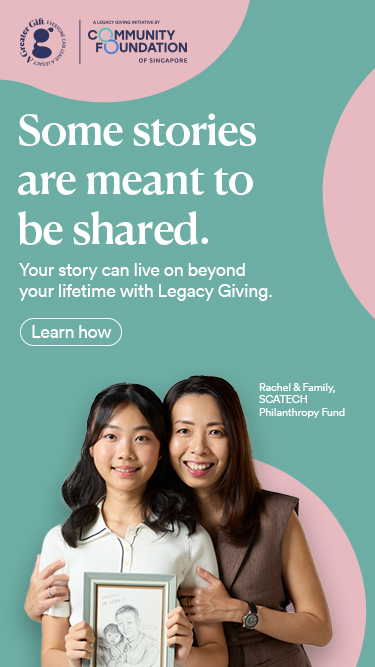Posts of the late former Law Society President Adrian Tan has been published as a book


LinkedIn posts by the late Mr Adrian Tan have recently been compiled and published as a book, titled “If I were King of Singapore”.
All proceeds from the book will go to the Adrian Tan Memorial Fund, which is set up by Mrs Adrian Tan and managed by the Community Foundation of Singapore (CFS).
This fund focuses on two primary causes that are close to Adrian’s heart: ensuring marginalised communities have access to legal services through Pro Bono SG and advocating the welfare of migrant workers.
Learn how CFS can support you in making an impact towards the causes that you care about: https://cf.org.sg/donors/how-we-assist-donors/.
2023年因病过世的新加坡律师公会前会长陈锦海律师,生前在LinkedIn发表的“如果我是新加坡国王”系列贴文已经结集成书,收入全数投入去年以他名义设立的“陈锦海纪念基金”。
陈锦海生前是义正律师事务所(TSMP Law Corporation)的合伙人,遗孀去年通过新加坡社区基金会(The Community Foundation of Singapore),设立纪念基金。
《联合早报》通过义正律所联合管理合伙人张祉盈律师,电邮访问陈锦海的妻子。
不愿具名的陈太太说,纪念基金旨在支持陈锦海撰写文章和社媒贴文常提起值得支持的慈善项目,“继续他的工作和精神遗产是有意义的”。
陈太太不愿透露纪念基金的金额,但根据新加坡社区基金会网站资料,设立基金的门槛为20万元。
基金的指定受益人都是陈锦海生前热衷的慈善项目,包括新加坡法律义务办事处(Pro Bono SG)和客工援助组织“康侍”(Healthserve)。
陈太太说,陈锦海在担任律师公会会长期间,强烈觉得新加坡法律义务办事处援助无力承担法律服务者的工作做得出色,所以基金将给予支持。为客工提供心理健康咨询,也将是基金的支持项目。
在法律界30多年的陈锦海,2022年1月起担任律师公会会长,上任两个月后不幸患癌,去年7月8日与世长辞,得年57岁。
撰写《纯爱手册》畅销书 自给自足完成大学教育
1988年,陈锦海在新加坡国立大学法学院念大一时,先后撰写刻画本地初级学院学生生活的《纯爱手册》上下集——“The Teenage Textbook”和“The Teenage Workbook”。
两本书成为畅销书,曾登上舞台剧、拍成电影和电视剧,而他也靠两本书的收入自给自足,完成大学教育。
陈太太说,尽管出身卑微,陈锦海对自己有机会追求法律职业向来很感恩。为了纪念他这份感激之情,她将另设“陈锦海助学金”协助国大的贫困法学生。
陈锦海敢怒敢言,在去世前的三年多,他在社媒积极发表法律相关贴文,旨在提高公众的法律知识。
因笔调活泼,涵盖法律变革、无偿服务和客工课题等的内容生动易读,赢得好评,LinkedIn的追踪者达3万8000个。
陈锦海曾说自己有时要评论新加坡政府的政策,却不想说“如果我是政府”,所以选择以“如果我是新加坡国王”的诙谐方式表达,“因为我们知道,这里暂时还没有国王”。
陈太太说,陈锦海一直想再出书,却被病症阻碍,“他不会想到,自己在LinkedIn发表的系列贴文会取得巨大成功,最终结集成书”。
“他去世后,公众和认识他的人都深切悲痛,许多人,甚至是通过LinkedIn认识他的人,都表示会想念他和他的作品。”
新书让陈锦海的声音永存
陈太太透露,很多人要求保留陈锦海的LinkedIn账户,以便继续阅读他生前的想法。
“这本书就这样出版了。对许多被他感动的人来说,这是让他的声音继续存在的一种方式。”
《如果我是新加坡国王》已在纪伊国屋书店(Kinokuniya)、大众书局、Book Bar和WHSmith樟宜分店出售。
信用:联合早报©新报业媒体有限公司。复制需要许可
This article was originally published in Zaobao here. Source: Zaobao © SPH Media Limited. Permission required for reproduction.
LinkedIn posts by the late Mr Adrian Tan have recently been compiled and published as a book, titled “If I were King of Singapore”.
All proceeds from the book will go to the Adrian Tan Memorial Fund, which is set up by Mrs Adrian Tan and managed by the Community Foundation of Singapore (CFS).
This fund focuses on two primary causes that are close to Adrian’s heart: ensuring marginalised communities have access to legal services through Pro Bono SG and advocating the welfare of migrant workers.
Learn how CFS can support you in making an impact towards the causes that you care about: https://cf.org.sg/donors/how-we-assist-donors/.
2023年因病过世的新加坡律师公会前会长陈锦海律师,生前在LinkedIn发表的“如果我是新加坡国王”系列贴文已经结集成书,收入全数投入去年以他名义设立的“陈锦海纪念基金”。
陈锦海生前是义正律师事务所(TSMP Law Corporation)的合伙人,遗孀去年通过新加坡社区基金会(The Community Foundation of Singapore),设立纪念基金。
《联合早报》通过义正律所联合管理合伙人张祉盈律师,电邮访问陈锦海的妻子。
不愿具名的陈太太说,纪念基金旨在支持陈锦海撰写文章和社媒贴文常提起值得支持的慈善项目,“继续他的工作和精神遗产是有意义的”。
陈太太不愿透露纪念基金的金额,但根据新加坡社区基金会网站资料,设立基金的门槛为20万元。
基金的指定受益人都是陈锦海生前热衷的慈善项目,包括新加坡法律义务办事处(Pro Bono SG)和客工援助组织“康侍”(Healthserve)。
陈太太说,陈锦海在担任律师公会会长期间,强烈觉得新加坡法律义务办事处援助无力承担法律服务者的工作做得出色,所以基金将给予支持。为客工提供心理健康咨询,也将是基金的支持项目。
在法律界30多年的陈锦海,2022年1月起担任律师公会会长,上任两个月后不幸患癌,去年7月8日与世长辞,得年57岁。
撰写《纯爱手册》畅销书 自给自足完成大学教育
1988年,陈锦海在新加坡国立大学法学院念大一时,先后撰写刻画本地初级学院学生生活的《纯爱手册》上下集——“The Teenage Textbook”和“The Teenage Workbook”。
两本书成为畅销书,曾登上舞台剧、拍成电影和电视剧,而他也靠两本书的收入自给自足,完成大学教育。
陈太太说,尽管出身卑微,陈锦海对自己有机会追求法律职业向来很感恩。为了纪念他这份感激之情,她将另设“陈锦海助学金”协助国大的贫困法学生。
陈锦海敢怒敢言,在去世前的三年多,他在社媒积极发表法律相关贴文,旨在提高公众的法律知识。
因笔调活泼,涵盖法律变革、无偿服务和客工课题等的内容生动易读,赢得好评,LinkedIn的追踪者达3万8000个。
陈锦海曾说自己有时要评论新加坡政府的政策,却不想说“如果我是政府”,所以选择以“如果我是新加坡国王”的诙谐方式表达,“因为我们知道,这里暂时还没有国王”。
陈太太说,陈锦海一直想再出书,却被病症阻碍,“他不会想到,自己在LinkedIn发表的系列贴文会取得巨大成功,最终结集成书”。
“他去世后,公众和认识他的人都深切悲痛,许多人,甚至是通过LinkedIn认识他的人,都表示会想念他和他的作品。”
新书让陈锦海的声音永存
陈太太透露,很多人要求保留陈锦海的LinkedIn账户,以便继续阅读他生前的想法。
“这本书就这样出版了。对许多被他感动的人来说,这是让他的声音继续存在的一种方式。”
《如果我是新加坡国王》已在纪伊国屋书店(Kinokuniya)、大众书局、Book Bar和WHSmith樟宜分店出售。
信用:联合早报©新报业媒体有限公司。复制需要许可
This article was originally published in Zaobao here. Source: Zaobao © SPH Media Limited. Permission required for reproduction.
- Related Topics For You: DONOR STORIES, DONOR-ADVISED FUND, INCLUSIVITY & INTEGRATION, NEWS



